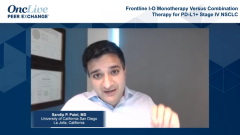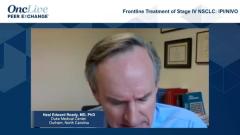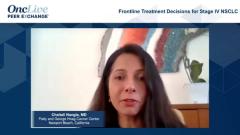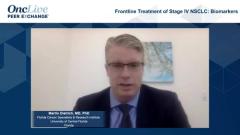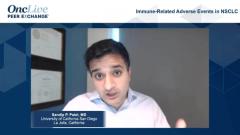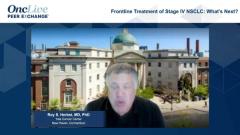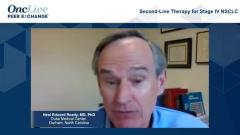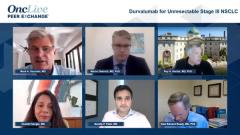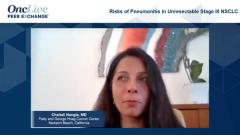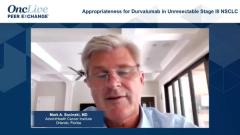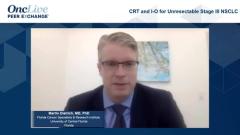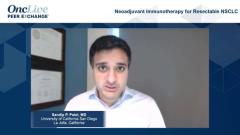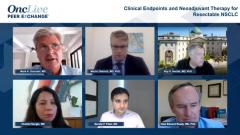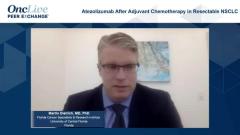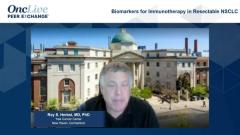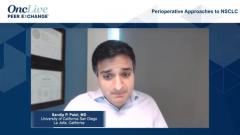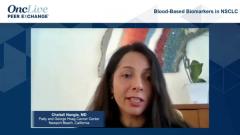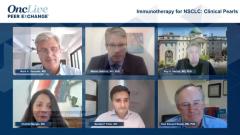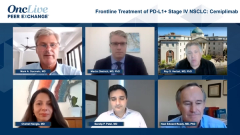
Immunotherapy for NSCLC: Clinical Pearls
Final takeaways from ASCO 2021 and the use of immunotherapy to treat various types of patients with non–small cell lung cancer.
Episodes in this series

Mark A. Socinski, MD: This has been an incredible discussion over the last hour and a half. I want to thank my colleagues for this rich and informative discussion. I want to give each of you an opportunity before we conclude to give our audience some final thoughts. I’ll start with Dr Dietrich and move down the list.
Martin Dietrich, MD, PhD: Thank you so much for having me. I was really excited about this ASCO [American Society of Clinical Oncology Annual Meeting]. I’m excited that we see long-term benefit in previously hard-to-reach immunotherapy populations. I’m very pleased to see that we’re seeing progress in the earlier curative setting, moving immunotherapy into that space, where we clearly have things to improve. One of the best presentations was to embrace immunotherapy adverse effects. If I have to give an outlook for the future, I believe we’ll need to double down on immunotherapy and the immunotherapy effect, down the lines of combinations and possibly triplet combinations. These adverse effects are probably the best marker of positive response that we have. We don’t have blood tests or other ways of seeing this in a clinical assessment. When we see these responses, it’s important for us and for our patients to explain to them that this is what we want to achieve: We activate their immune system from a hibernation state into an antitumor state. And all the adverse effects are not necessarily adverse effects but basically just hitting the wrong targets while firing in the right direction. Those were all great steps forward moving the needle. The biomarker selection is going to be more and more exciting. I can’t wait to see the KRAS combinations with immunotherapy at the next ASCO, hopefully. There’s plenty of good progress. It can be more complicated, but we’ll be seeing these benefits in our patients in the near future.
Mark A. Socinski, MD: Thank you, Martin. Dr Herbst?
Roy S. Herbst, MD, PhD: It’s a brave new world, and we have many new modalities of therapy that we focused on today: immunotherapy and its advances in stage IV disease, and now moving up to stage III. We’re already seeing benefits as we discussed. In some of our careers, we’ve seen such an amazing change, but we still have a way to go. From a patient’s point of view, there are still many who aren’t benefiting, and lung cancer remains 1 of the major causes of cancer deaths. We have to continue to up our game, work with biomarkers, and be smarter in our trials and in our therapy. But all the tools are before us. This was a very exciting discussion, bringing in all the new modalities of therapy.
Mark A. Socinski, MD: Thanks, Roy. Dr Nangia?
Chaitali Nangia, MD: I found this ASCO interesting for many reasons, primarily for the development in the ongoing trials in the neoadjuvant/adjuvant space. I thought that was really exciting. I was very excited to see the data with the I/O [immuno-oncology]–chemotherapy…KRAS was a good story. It was an excellent presentation. Also…it was interesting to look into racial disparities in clinical trial involvements and even molecular testing: ctDNA [circulating tumor DNA], underrepresentation. That was also very exciting.
Mark A. Socinski, MD: Dr Patel?
Sandip P. Patel, MD: ASCO was wonderful, showing the breadth and depth of everything that’s going on as many are aware. The overall mortality of cancer in the United States has improved over the past 2 years, driven by improvements in care and in lung cancer, particular non–small cell lung cancer. We talked about multiple bespoke precision medicine approaches. But 1 of the ASCO presentations that’s really poignant and shows how much further we have to go in terms of implementation science was the rate of molecular testing. EGFR and ALK in 1 large practice were stronger in 70% of patients, meaning 30% of patients won’t even need to get tested for EGFR and ALK. But BRAF, which is likely a surrogate for other next-generation-targeted mutations—KRAS, and so on—was about 50%. If we were on a breast cancer discussion and 50% of patients were not being HER2 [human epidermal growth factor receptor 2] tested, it just wouldn’t happen. It just shows from an implementation science standpoint how much further we have to go.
We have the benefit of being able to do this in 2 tubes of blood. We have liquid biopsies that can help us if you run out of tissue. How can we best ensure that patients get adequate molecular diagnosis? We don’t see a spot-on scan and then…start chemotherapy anymore—or ever. We get the biopsy, and we understand what’s going on. The molecular diagnosis in non–small cell lung cancer is crucial. Not only do we want to get the patients on the right path in terms of targeted therapy, but if you get them on the wrong path, you’re giving expensive, ineffective, and toxic therapy with immunotherapy for that patient population. We need to make sure that we test, and we don’t guess, so we can unlock the potential of precision therapy. It’s so crucial.
Mark A. Socinski, MD: Thank you. Lastly, Dr Ready?
Neal Edward Ready, MD, PhD:Thanks. We’re all excited about early-stage disease and everything that’s been said. For advanced disease, to improve 5-year survival we need to come up with a strong and new combination. As Roy alluded to, that will probably have different approaches in immunologically cold tumors vs immunologically hot tumors. We’re going to have to choose immune combination at personalized rate.
Mark A. Socinski, MD: Great. Thank you all. This has been fantastic. We want to thank our viewing audience. We’re going to close now, but we hope you found this OncLive® Peer Exchange® discussion to be useful and informative. Thank you very much for joining.
TRANSCRIPT EDITED FOR CLARITY


